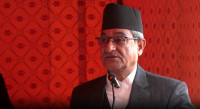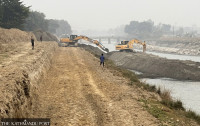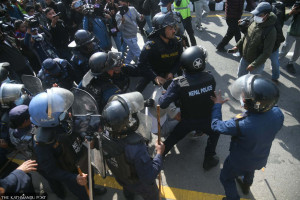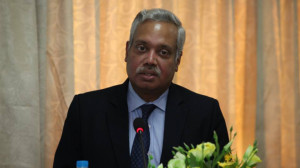National
India wants seven amendments to Nepal’s constitution: Confidential document
The Indian government has asked the Nepali side to make seven amendments to the new constitution, according to an Indian Government classified report published by the Indian Express.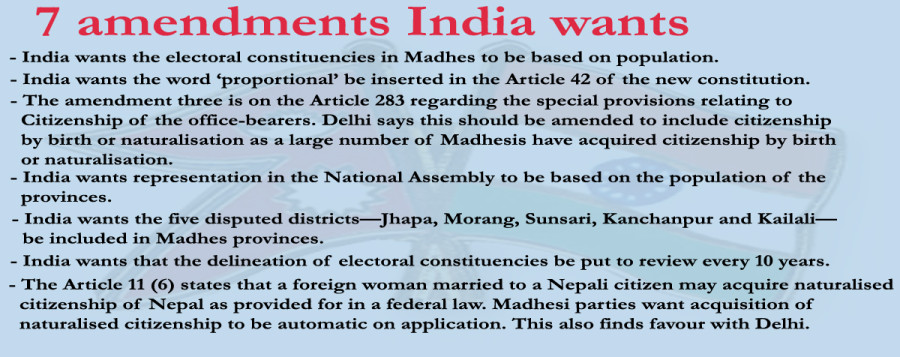
The Indian government has asked the Nepali side to make seven amendments to the new constitution, according to an Indian Government classified report published by the Indian Express.
The India Ministry of External Affairs has said that the seven amendments are indispensable stating that these are the issues of concerns raised by the disgruntled Madhesi and Tharu groups.
The amendments wanted by the South bloc have been forwarded to Nepali leadership via Indian ambassador Ranjit Rae. Rae, who had flown into New Delhi on Monday a day after the promulgation of the new constution, returned to Kathmandu on Wednesday and he headed straight to Prime Minister’s official residence in Baluwatar to convey the message from New Delhi.
Amendment 1
India wants the electoral constituencies in Madhes to be based on population. The Article 63 (3) of the Interim Constitution states that the electoral constituencies will be based on population, geography and special characteristics,“ and in the case of Madhes on the basis of percentage of population.” The latter phrase, however, has been omitted from Article 84 of the new constitution. India wants it re-inserted.
Amendment 2
India wants the word ‘proportional’ be inserted in the Article 42 of the new constitution. The article states that “the right to participate in state structures on the basis of principles of inclusion”. The Article 21 of the Interim constitution, however, mentioned that various groups would have “the right to participate in state structures on the basis of principles of proportional inclusion”. The word ‘proportional’ has been dropped from the Article 42 of the new constitution. India has asked the word to be reinstated.
Amendment 3
The amendment three is on the Article 283 regarding the special provisions relating to Citizenship of the office-bearers. The article states that the only those who have a citizenship by descent will be entitled to the position of president, vice president, PM, chief justice, speaker of the parliament, chairperson of National Assembly, head of the province, chief minister, speaker of provincial assembly and chief of security bodies.
Delhi says this should be amended to include citizenship by birth or naturalisation as a large number of Madhesis have acquired citizenship by birth or naturalisation.
Amendment 4
India wants representation in the National Assembly to be based on the population of the provinces. But the Article 86 of the new Constitution states that National Assembly will comprise 8 members from each of seven states and three nominated members.
Amendment 5
The five disputed districts—Jhapa, Morang, Sunsari, Kanchanpur and Kailali—be included in Madhes provinces. These districts are currently in province one (Jhapa, Morang, Sunsari) and province six (Kailali, Kanchanpur) along with hilly and mountainous districts.
Amendment 6
The article 281 (12) states that the delineation of electoral constituencies shall be put to review in every 20 years. It was to be reviewed on every 10 years in the interim constitution. India wants this time to be restored to 10 years.
Amendment 7
The Article 11 (6) states that a foreign woman married to a Nepali citizen may acquire naturalised citizenship of Nepal as provided for in a federal law. Madhesi parties want acquisition of naturalised citizenship to be automatic on application. This also finds favour with Delhi.




 12.12°C Kathmandu
12.12°C Kathmandu
